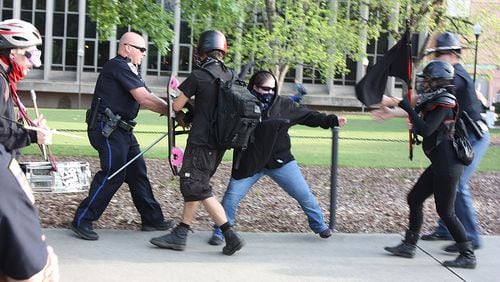Had you remained deceived about the ubiquity of open discourse on America’s college campuses, recent weeks should have set you right.
At Claremont McKenna College in California, protesters two weeks ago physically blocked the entrance to a building where the conservative author Heather MacDonald was to speak. MacDonald has criticized what she calls generally, in a recent book, “The War on Cops” and specifically the Black Lives Matter movement. In return, the group has falsely branded her a “notorious white supremacist fascist.” Last month at Middlebury College in Vermont, students who had swallowed gross mischaracterizations of the libertarian political scientist Charles Murray shouted him down from a stage, then assaulted him and faculty members accompanying him from the lecture hall. At the University of California-Berkeley — once again a kind of epicenter for protests about free speech, only this time in opposition to it — officials first cancelled, then on Thursday said they would allow, a speech by commentator Ann Coulter. This followed the cancellations of other talks at the school by people lumped into a “right-wing” category. Closer to home, a white nationalist’s appearance at Auburn University sparked a confrontation between his followers and a ragtag group of “antifa” (anti-fascist) protesters.
This scene may yet come closer to home still. The specifics of these speakers’ messages aside — and they fall on a spectrum, in my view, that starts with the respectable MacDonald and Murray before sliding down to Coulter and then much further to the others — what is disturbing is the way these students oppose ideas they find disagreeable, by physical force and even violence. It leads Larry Arnn to ask a question surely on the minds of many:
"Why would a bunch of 19-year-olds rage and take over college campuses, and demand the redefinition of 300-year-old colleges, the oldest in America, accuse their entire history of racism, cause adults' careers to be disrupted or ruined, and demand complete changes to the curriculum – they, having never completed a curriculum? … What leads those people, who 10 years ago were just little kids and five years ago were hardly adolescents? Why do they do this?"
Arnn, the president of Hillsdale College in Michigan, who was in Atlanta this past week for a symposium the classical liberal arts college hosted here, offers an answer: “They’ve been taught to do this, in the classroom.”
Specifically, Arnn says, students today are taught “that your consciousness is — to use a term of art in Marx — formed by things in your background, things that happened to you, and things that happened to those who have come before you.” That, he says, “makes you a victim of those things.”
It also means people are permanently divided into groups based on their backgrounds: race, ethnicity, but also convictions and even occupations. “Once that becomes the sovereign doctrine,” he says, “the purpose of higher education is not any more transcending those things, it’s emphasizing, liberating, promoting those things.”
This perversion of the purpose of higher education is what we’re now seeing play out on college campuses.
“If you hold people who are supposed to be members with you in a college … in contempt, and will speak to them only with loud scorn,” he says, that is “destructive of what a college is supposed to be. In other words, you’re supposed to be civil to each other, and you’re supposed to contrive your arguments so they meet academic standards, which means a real quest for the truth of the matter, and not just the assertion of the thing that you think.
“When that goes, the college is closed, effectively. And we’re two or three steps beyond that now.”
Those of us who were not so taught in our classrooms might see these students’ tactics as a tacit acknowledgment their own ideas and arguments are unpersuasive. Here Arnn, who has studied and written about Winston Churchill, cites the great Briton on opponents of open dialogue:
“Look what they’re afraid of: words, just words. They will not have them spoken. Is that not a sign of their weakness?”






